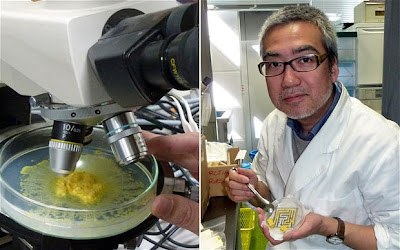 |
| Toshiyuki Nakagaki, professor of Future University Hakodate (source) |
Here, the slime mold (physarum polycephalum) works realtively quick. This video shows how all other "bad attempts" at solving the puzzle will quickly die out to leave only the shorts route.
Atsushi Tero, from Kyushu University, southern Japan, who conducted the research, believes that the intelligence skills possessed by slime mould networks could potentially be used in the future design of transport systems or electric transmission lines (source). "Computers are not so good at analysing the best routes that connect many base points because the volume of calculations becomes too large for them," he said.
In this video, researchers placed food at railway stations around Tokyo (not Bay of Tokyo at bottom middle). The fungus collaborates, spreading out to map many possible configurations and then dies out to highlight the shortest routes between cities and the most efficient overall system map.
So this technology is smarter than humans, and even supercomputers. But isn't the web of human knowledge a product of our technology? Isn't every man as smart as his ability to navigate the internet, or smartphone? In much the same way, now that we have and control this slime technology, isn't it part of our knowledge?
My pool cover is super intelligent apparently :)
ReplyDeleteI have seen the computer do the shortest routes but never that fast. Quite interesting!
ReplyDeleteJust call me 4ddf6 for short.
ReplyDeleteDad
DeleteCould this be studied as to it's possible effect on Covid 19 virus? I cannot sleep with anticipation. Remember the influenza virus and worm poop medicine in New York? A movie was made called, "Awakenings," with Robin Williams6
ReplyDelete